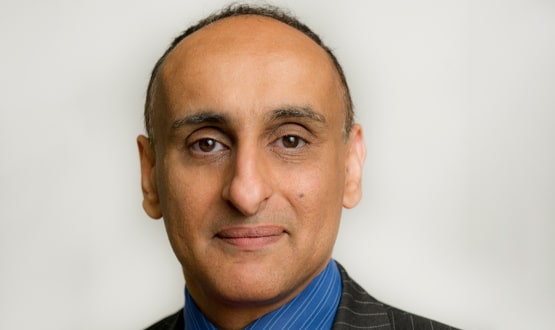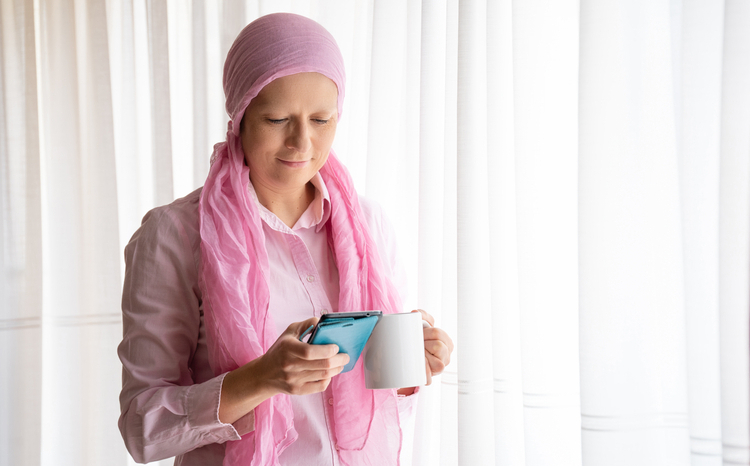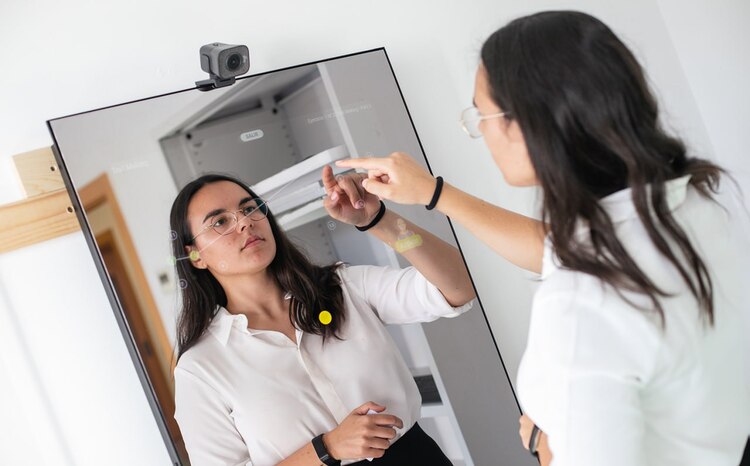Beyond the hospital walls: how digital will revolutionise cancer care
- 16 November 2022

Dr Majid Kazmi, director of innovation for cancer and surgery and deputy medical director, Guy’s and St Thomas’ NHS Foundation Trust, outlines how digital promises to revolutionise cancer care.
The number of people living longer with cancer is on the rise. In the UK, fifty percent of people can now expect to live with cancer for ten years or more after a diagnosis1.
This is clearly a good thing but it does present a challenge for the NHS when combined with a shrinking oncology workforce2 and escalating costs.
With these resource challenges, managing patients through their cancer journey is becoming more difficult.
And as people live longer with cancer, keeping patients connected, better informed and giving them the ability to make decisions about their care becomes increasingly important.
The power of technology
As a cancer doctor, I often find that patients provide feedback about how they’re not getting enough information about their disease or treatment.
The problem, however, is that this information is given to patients, carers and families on paper, all at the same time – and there’s a lot of it. These paper leaflets are then stored away or pile up and it’s hard for people to easily refer back when they need them without feeling overwhelmed by the quantity.
Technology and the ability to engage and monitor patients remotely has the power to change this. In the future the hospital-centric model, where everything is conducted in one central place, will need to change for many reasons: environmental impact, the cost of travel for patients as well as patient experience.
If you look back to how care used to be given, it was in people’s homes. Technology has the power to offer this again, just in an updated, scalable way which will provide a better, safer experience for patients.
Why the current model of care needs to change
When you look at the traditional patient journey through cancer diagnosis and treatment, there’s a lot of time spent waiting. Waiting for an appointment. Waiting for a diagnosis. Waiting for treatment.
Patients currently spend a vast amount of time interacting with the healthcare system in a way which doesn’t always add value to them. For example, people may have multiple meetings to discuss the same thing, they might have consultations where all the information isn’t ready or they might spend time walking to different parts of the hospital to collect medication or have a scan after a consultation. All of these interactions are not really built around the patient. It is simply a pathway which has grown organically as more and more people have required treatment. It isn’t patient centred, clinically led or research driven and patients are telling us it needs to change.
Transforming the patient experience
Digital cancer care can play a key role in transforming the patient experience and as a result, improve patient outcomes. By using technology, we can empower patients and their family/carers to take a greater ownership in decisions about their care.
At Guy’s Cancer we’ve started working with Careology, a digital cancer care specialist who has designed a patient facing app and connected dashboard for healthcare professionals which is built around the person and their experience during treatment.
Careology allows patients, via its app or online portal, to keep information about their care in one place, such as their symptoms and side effects, managing medicines and recording any issues. Clinicians then get a real-time view of how patients are reacting to treatment between appointments, enabling them to care for patients more proactively and with better insight.
What’s exciting about this collaboration for Guy’s Cancer is that it will allow us to transform what we’re doing for patients, and support our ambitions to be world leaders in digital cancer care.
We’re working with Careology to define exactly what our patients need and when they need it, so we can make their treatment pathway as efficient and as person-centred as possible. This means we can start to make every contact we have with the patient more meaningful and give them personalised information at their fingertips – providing them with ownership over their treatment pathway.
Our ambition by using patient-facing technology in this way is to enable people to progress through their treatment as well as possible – to manage their side effects, have less need to contact our oncology services and ultimately have fewer hospital admissions. In the current cancer pathway, there are a lot of tasks patients could carry out themselves at home without needing to travel to a hospital, such as providing consent for treatment.
This collaboration will allow us to realise some tangible differences in the way we look after our patients which we’ve never been able to do before. Our ambition is to democratise healthcare and this collaboration will be a central part of that. It will help to make the cancer care we offer patients more consumer responsive and less paternalistic.
At Guy’s Cancer we’re very conscious of the fact that we don’t want anyone to be left behind just because we are digitalising the process. By using thoughtful design and finding ways to motivate historically excluded groups, we will ensure all patient’s opinions will be heard, their needs met and that they can have greater control over their care.
We also want to use this technology to provide reassurance and support for those patients in remission who have completed treatment but may have anxiety around their cancer returning. At the moment people tell us they feel under supported after they’ve finished their treatment.
By working with Careology and through their integration with Macmillan Cancer Support we can provide personalised health information to patients in the app. This presents an exciting opportunity for us to pool these skills and capabilities which can be delivered straight to someone’s device and will hopefully address the current gap in post-treatment support.
Digital could have a global impact on cancer
The work we’re doing has the potential to have a global impact in cancer care. Careology’s platform equips healthcare professionals with real-time, relevant information that allows them to provide a more responsive service – freeing up time to care and reducing the need for unnecessary admin. User experience is key for enabling patients and carers to be better informed and supported. Patients don’t engage if they feel they’re not getting good value from the system. That’s why we need to build innovative and accessible solutions which have the patient’s experience at the forefront in order to provide a modern cancer care model.
I’m encouraged about what Guy’s Cancer can deliver for patients as we move full steam ahead with our digital transformation to build the world’s leading cancer care platform.
1 https://www.lshtm.ac.uk/research/research-action/features/surviving-cancer-how-big-data-helping-patients-live-longer
2 https://www.rcr.ac.uk/posts/new-rcr-workforce-report-shows-oncologist-shortages-continue-impact-patients





1 Comments
It would be interesting to know if this patient portal will be replaced by the Epic version once GSTT go live, and what benefits this provides oncology patients over and above a well designed generic patient portal.
Comments are closed.